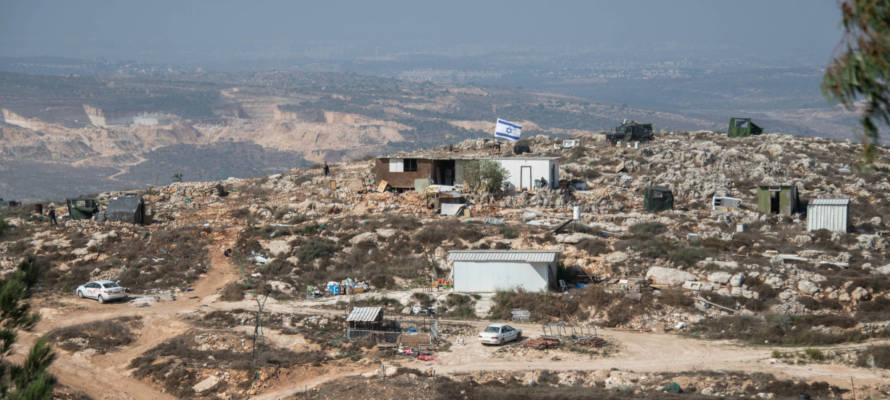Seventy percent of the Jewish public feel a historical connection to Judea and Samaria, 63% an emotional connection, and 48% a religious connection.
By Hanan Greenwood, Israel Hayom via JNS
Surprising data on the public’s perception of Israeli communities in Judea and Samaria has emerged from a survey commissioned by the Israel Defense and Security Forum (IDSF), published on the occasion of the Israel Security Conference, to be held on Tuesday, May 9, in Jerusalem, as a joint venture of Israel Hayom and the IDSF.
The survey, conducted among a representative sample of 1,191 citizens, revealed that 70% of the Jewish public feel a historical connection to Judea and Samaria, 63% an emotional connection and 48% a religious connection. In contrast, only 37% of Israeli Arabs feel a historical connection to the West Bank, while 33% and 32%, respectively, feel a historical and religious affinity to it. At the same time, 90% of right-wing voters feel a historical affinity towards Judea and Samaria, and 46% of center-party voters answered the same. Among the supporters of the left-wing parties, 27% of those sampled agreed that they have a historical affiliation with the disputed region.
The security conference will be held on Tuesday in the presence of Israeli Prime Minister Benjamin Netanyahu, Defense Minister Yoav Gallant, Police Commissioner Yaakov Shabtai, along with other ministers and members of Knesset. The conference will host about 300 senior members of the IDSF, leading government officials and politicians, senior figures from the defense establishment as well as heads of various organizations, and will also be open to the general public. Conference participants are expected to discuss the Iranian issue, the Abraham Accords, relations with the Palestinians, challenges to governance, personal security and other issues.
It’s clear from the study that many Israelis tend to shy away from visiting Jewish communities in Judea and Samaria, either for security reasons or due to technical considerations. Eighty percent of the Israelis surveyed said that travel in Judea and Samaria is dangerous. However, only 9% admitted to visiting there on a weekly basis over the course of the last three years. Twenty percent of respondents had not even paid one visit to Judea and Samaria in the last three years.
It appears that a person’s family circle is a key factor influencing whether or not that individual visits this area. Forty-eight percent of right-wing respondents visit Judea and Samaria to meet family, compared with only 20% of those identified with the left. The most popular reasons for visiting the region were found to be family (42%), historical sites (36%), hiking (31%), work and business (28%) and both military and security-related service (27%).
Jewish historical sites in Judea and Samaria are a popular attraction. Some 47% of respondents had visited the Cave of the Patriarchs in Hebron and 37% had visited Rachel’s Tomb at the entrance to Bethlehem. Twenty-seven percent have visited the Prophet Samuel’s Tomb and 25% have been to the site of Ancient Shiloh, Israel’s spiritual center in the time of the Judges. Twelve percent of respondents had visited Joseph’s Tomb in Nablus, a site that can only be reached by bulletproof bus and with a sizable military escort.
Israelis do not take part in the boycott
The survey found that only 4% of Jews completely avoid purchasing products produced in Judea and Samaria, while 71% have no problem purchasing such products. Some 37% of respondents even said they prefer to purchase products of the region.
Among Israeli Arabs, 19% completely avoid buying Judea and Samaria produce, while 53% see no problem in purchasing such products, of whom 21% actually prefer to buy them. Forty-one percent of individuals who identify as being left-wing endeavor to avoid purchasing products manufactured in Judea and Samaria or avoid it completely, compared with 32% of Israeli Arabs who provided a similar response.
As far as living in Judea and Samaria is concerned, 47% of the Jewish survey respondents answered that they would consider moving there. However, 8% said that they would only do so if this involved a move to communities on the Israeli side of the security fence, and 12% stipulated a condition of moving to settlements or large cities.
Those who responded in the negative (43%) were asked whether the extension of Israeli sovereignty to Judea and Samaria would change their mind, and roughly one third (29%) said that it would. Similarly, 66% of the Jewish population in Israel believe that the land reserves in Judea and Samaria could provide the solution to the country’s current housing crisis.
‘Potential solution to the housing crisis’
“The survey points to two key findings,” said IDSF founder and chairman Brig. Gen. (res.) Amir Avivi. “First, the majority of the Israeli public today has a special and deep connection to Judea and Samaria. Secondly, today it is impossible to separate the Israeli public from Judea and Samaria, as there is a deep bond that ties between them economically, geographically and socially. This is true for both the Jewish public and the Israeli Arabs.”
Moreover, he added, “The majority of the Jewish population regards Judea and Samaria as a potential solution to the housing crisis, with a high degree of willingness to move there.”
Originally published by Israel Hayom.
